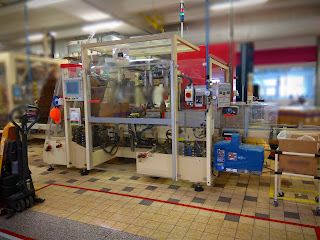Challenges in Technical translation
 Following the boom of globalisation,
translation services are being more and more in demand by companies who want to
relocate their business to new areas or want to propose their products to a wider
public. Technical translation is, in its narrower sense, a specialised field of
translation dealing with any texts related to technological areas. Such
documents contain very specialised key terminologies. One could think that this
type of translation would be the simplest one of all, arguing that each term is
factual and represents exclusively one specific object or action invented by
humans themselves. But actually, when I encountered the opportunity to translate
technical documents and interpret manufacturing processes in a chocolate
factory, with hardly any knowledge on technical translation, I though
the same along with my boss. I was aware this would be a tough task, yet I agreed
on this project. We did not know how wrong we were.
Following the boom of globalisation,
translation services are being more and more in demand by companies who want to
relocate their business to new areas or want to propose their products to a wider
public. Technical translation is, in its narrower sense, a specialised field of
translation dealing with any texts related to technological areas. Such
documents contain very specialised key terminologies. One could think that this
type of translation would be the simplest one of all, arguing that each term is
factual and represents exclusively one specific object or action invented by
humans themselves. But actually, when I encountered the opportunity to translate
technical documents and interpret manufacturing processes in a chocolate
factory, with hardly any knowledge on technical translation, I though
the same along with my boss. I was aware this would be a tough task, yet I agreed
on this project. We did not know how wrong we were.
Where do the problems of technical translation
(TT) lie?
- Misconception on terminology: TT is not just about terminology. The truth is that only 5-10% of the content represents specific technical terminology, while the rest is common language. However, this common language is often absent or incorrectly written due to the focus on technical terms, transforming the translator into an artist and a repairer of the source text. The translator needs to identify key words, understand the ideas behind them and create a whole new target text, comprehensible for the client and its culture.
- Cultural context: This leads us to the importance of the knowledge of cultures. Understanding differences in cultures is one of the 3 pillars of TT. You may be surprised how many cultural connotations hide inside a technical document. Measures, date formats or symbols need to be adapted, as well as safety information, warnings or cautions (each one meaning a different level of hazard in different cultures).
- Technical knowledge itself: Not only does TT imply a high level of specific terminology used, but it also implies subject knowledge. If the translator does not understand the main principles of engineering, chemical reactions or manufacturing for example, he or she will be lost in translation. The key is to understand how things work. A term’s deeper meaning needs to be understood in order to provide the client with precise and accurate translation.
- Internal company language: Even if you perfectly master technical terminology, another issue may confuse you. In the factories for example, every company has its own internal language, a type of slang commonly used at the workplace. Not even looking up the words in the dictionary will help you. Some parts of machines can be named by their product names and not by what they are in principle. Moreover, the translator needs to communicate with the company receiving the translation in the target language to find out which slang equivalent the workers use there in order to secure better understanding of the document.
- Faster speed of creation of new technologies: Along with the faster pace of development of new technologies comes the challenge of creating a terminology for them. We encounter new inventions every day in this globalised world, which requires us to keep up with this phenomenon by coming up with new terms. The challenge arises: how can translators keep an eye on new technologies and their terminologies every day while working 8 hours per day?
- Legal considerations: And finally, translator’s signature under the translation means responsibility for the document’s correctness. Errors in translation may result in real damages. Injuries can be caused by faulty usage of devices, leading to financial losses for the company.
Flawless and precise translation is
crucial in the technical field. One incorrectly chosen word can cause misunderstanding
of assembling processes or usage of the product. In the midst of the translation process,
the translator balances between creative and exact worlds, using translator's language
liveliness. Translators must be aware of a big number of challenges they may
encounter over their careers. Technical translation requires a lot of time,
patience and experience, but once you discover the fascinating fusion between art
and science behind, you will never again long to change your job.
And what about you? Did you know about these difficulties? Is there something that surprised you? Or do you identify with this article? Feel free to let me know in the comments down below :)
Anezka T.
Sources:
- https://www.daytranslations.com/blog/challenges-in-technical-translation/
- http://octopustranslations.com/technical-translations-challenges-and-possible-solutions/
- http://repository.kln.ac.lk/handle/123456789/8492
- https://www.icanlocalize.com/site/2013/11/why-do-technical-texts-have-to-be-handled-by-a-technical-translator




Thank you for this article! I never really thought about Technical translation the way you describe it. Now I have a better understanding of all the obstacles a translator may have while working with such a text.
RépondreSupprimerI was mostly surprised by the point where you describe internal company language. It takes a lot of time and effort to get acquainted with all possible expressions workers use at the workplace so it is quite challenging. However, it seems interesting as well.
Have you already translated technical texts where such expressions were used?
Daria A.
Hello Daria!
SupprimerThank you for your comment. I'm glad you learned something new from my article, and that my goal to shed light on this sector was achieved!
Indeed, it takes some time, but once you create your terminology for the company you work with, it goes way more easily :) I can tell you this from my own experience in a chocolate factory. I translated over 100 pages of technical documents and was interpreting in the factory for 2 weeks. At the beginning, it wasn't a piece of cake, but as soon as I had been supervised by a professional translator, me and my colleague created a terminology for this factory and we were progressing two times faster.
Anezka T.
An article that taught me a lot, congratulations!
RépondreSupprimerI found the part where you explain that all companies have their own jargon, but also the part on legal considerations, particularly interesting. What many people do not understand is that every word must be calibrated and nothing must be left to chance and you explain it well !
Luca Z.
RépondreSupprimerHello Luca!
SupprimerThank you for your comment. I'm happy you particularly noticed the problem of precision and accuracy in technical translation. It's truly an issue that many people don't realise, mainly employers who often seek to save money on translators/interpretors. They hire a person with no experience in TT and then get disappointed when they see the final results. You also marginally mentioned this in your article, just in a different context (professional translator/interpreter vs. intelligent glasses) and I can see that we agree on this point. I think we should talk more about such problems to the wide public.
Anezka T.
Thank you so much for your note, it encourages us to have more and more discs in our lives, so kind to you, I really hope you'll make more and more excellent posts and let's talk more and more, thank you so much, love.
RépondreSupprimerTranslation in Duabi
Translation Services in Duabi
Translation Company in Duabi
Legal Translation in Duabi
Thanks, Yes there are so many challenges have to faces a company while delivering voice translation services to their clients.
RépondreSupprimerYour blog is very nice and we hope you are providing more information in future times.
RépondreSupprimerTranslation Company In India | Voice-over Services | E-learning Localization | Localization | Translation Services In Pune | Translation And Localization
Very Good Inforamtaion Thank you for sharing such a good blog.
RépondreSupprimerIndian Languages Translator |
Translation Company In India |
E-learning Localization|
Voice-over Services |
Translation And Localization |
Localization Companies In India
Great Blog and good Information
RépondreSupprimerLocalization Companies In Mumbai
| Voice Over Services India
| Translation Companies In Mumbai
| Voice Over Companies In India
| Translation Services In Mumbai
| Localization Companies In India
I found this very informative. This blog helps me a lot in my research regarding translation services. Impressive and highly professional. Legal translation is the translation of texts within the field of law. I really like your article. Hire a certified agency for Legal translation in Dubai.
RépondreSupprimertranslation in dubai
legal translation services in dubai
legal translation company in dubai
translation services in dubai
translation company in dubai
LenguaePro is an experienced translation and interpretation company that has two of its branches in the US and Brazil, They deal with companies of all sizes and in a variety of sectors. They work with the most frequent Western languages, such as English, Spanish, Portuguese, German, French, and Italian, as well as the least popular languages, they are known for their fluency and adaptability to the target language while translating documents of various sizes. The services are provided by a highly-skilled workforce.
RépondreSupprimermy friend needs this post, so i share your post with my friend and he needs also translation services post please share
RépondreSupprimerEnglish to Vietnamese Translation Services by Sinovantage
RépondreSupprimer